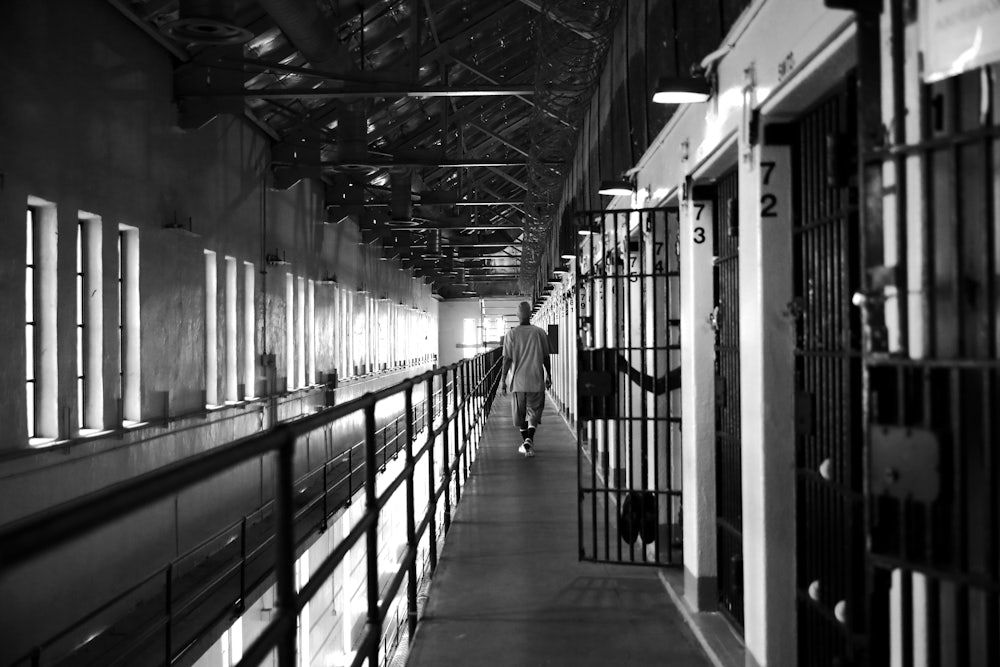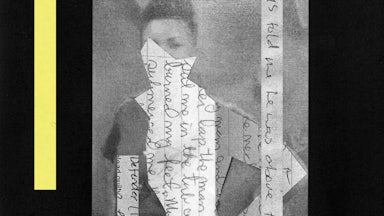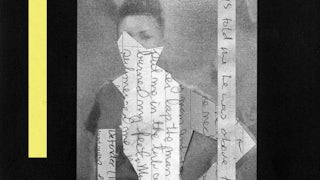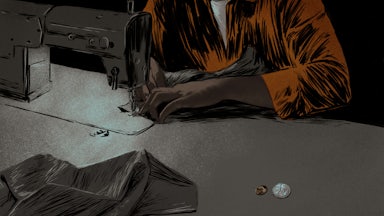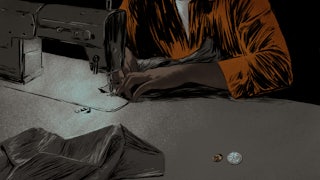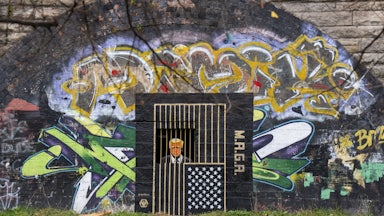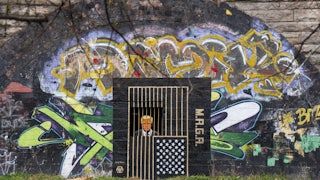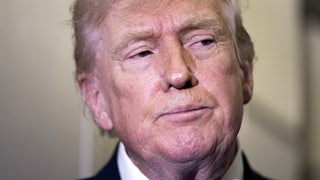Where there was once a window on an upper floor of the St. Louis City Justice Center stood a row of people in yellow prison uniforms, with masks over their noses and mouths, framed by shards of broken glass. The uprising on Saturday, in which 117 incarcerated people took part, and which participants said was to protest unsafe pandemic conditions, was part of a wave of demonstrations that have taken place in the jail since the end of 2020. Cortez Easterwood-Bey, who is jailed there and recounted the events in a statement published at Rampant, said that after he and more than 50 others “stood together in solidarity outside of our cells as a form of peaceful protest,” on December 29, 2020, prison staff tear-gassed them and sprayed them with cold water, and locked some of them down “in the hole” without heat, dry clothing, or new face masks. “All this because we were trying to tell jail staff and management that we don’t want to DIE.”
Saturday’s demonstration in St. Louis exposed the deadly risks people in prisons and jails in the United States have been subject to for a year now. Now that a vaccine is available, the health of incarcerated people has become another political debate. Missouri is alone in placing prisoners in the lowest-priority group. Lashawn Casey, who tested positive for the coronavirus at Chillicothe Correctional Center, told St. Louis Public Radio that purposely delaying vaccinations to people in prisons conveys the belief “that some people’s lives are more valuable than others’.”
Inmates at St. Louis Justice Center have taken over at least part of the jail. There have been protests over COVID-19 dangers inside. Not sure if this is part of that. pic.twitter.com/roSCtkIHSK
— Doyle Murphy (@DoyleMurphy) February 6, 2021
At first, very few states were offering people in jails and prisons the vaccines, though some have after pressure. Typically, vaccines have gone to prison health care workers and corrections staff first, as in Missouri, where the City Justice Center is located and where 42 people in state prisons have died from Covid-19, and Texas, where more than 240 people incarcerated in state prisons have died from Covid-19. (These could be undercounts. We do not yet know how many people in jails and prisons nationwide have died from Covid-19. The UCLA Law Covid-19 Behind Bars Data Project has tracked 2,311 confirmed deaths.) Of the 2.3 million people incarcerated in the U.S., according to The Guardian, only 39,000 had been vaccinated since doses were made available in January 2021.
While incarcerated people are demanding more to protect themselves from Covid-19, some prison staff have turned the vaccine down. More than half of corrections officers in Massachusetts have refused the vaccine; almost half of Iowa’s prison workers refused. In Oklahoma, some prisoners, too, have been skeptical of the vaccine, pointing to the history of prisons being used for medical experimentation. One prison staffer in Texas told the Marshall Project that “he was more worried about his co-workers who are listening to Alex Jones refusing to take it than he was about prisoners opposing it.”
The St. Louis uprising was a rare moment in which incarcerated people’s own story got outside to counter the jail officials’ story that the demonstrators had no demands around Covid-19 and their health. A woman who came to the jail with her daughter to offer support for the uprising told KDSK that her son had died there a few weeks before. “The riot was the wake-up we needed,” her daughter said. Representative Cori Bush, the Democratic congresswoman who represents St. Louis, offered her support, too, and demanded transparency from the jail. “I want to ensure that the demands made by those being held at CJC are not ignored, and I plan to investigate this further,” Bush said in a statement Saturday. “There needs to be a plan to improve conditions and decarcerate.”
Incarcerated people and their families are right to anticipate that they won’t be given adequate information by jails and prisons. Conditions have become that much harder to publicize in the pandemic, when visits were largely eliminated and even video visits and electronic messages have been limited. “Hey sis, hope all is well with you and the family just took the first shot of the COVID vaccine. 21 days until I can get the next one,” Edwin Segarra said in a message to his family, sent from the federal jail in Brooklyn. Four days later, as the New York Daily News also reported, he messaged his sister, Wendy Sanchez, to say he had tested positive. Segarra died the following day. He was 46 years old.
“It’s frustrating because he wanted to come out and have another chance,” Sanchez told the Daily News. To date, his family said, jail officials had not given the family additional details about Edwin’s death. Fears about the vaccine will only be magnified in this information vacuum, potentially making more people reluctant to be vaccinated. Segarra’s family, along with Black Lives Matter Greater New York, held a protest outside the jail on Monday. “Hearing the crowd below, the silhouettes of those incarcerated could be seen scaling the bars on their windows and heard hammering the glass with their fists,” amNY reporter Dean Moses wrote. “Son of Edwin Segarra Eddie Segarra called out to those held up in the facility, shouting: ‘I see you; I hear you!’” That same night, people in St. Louis gathered again outside the jail.
